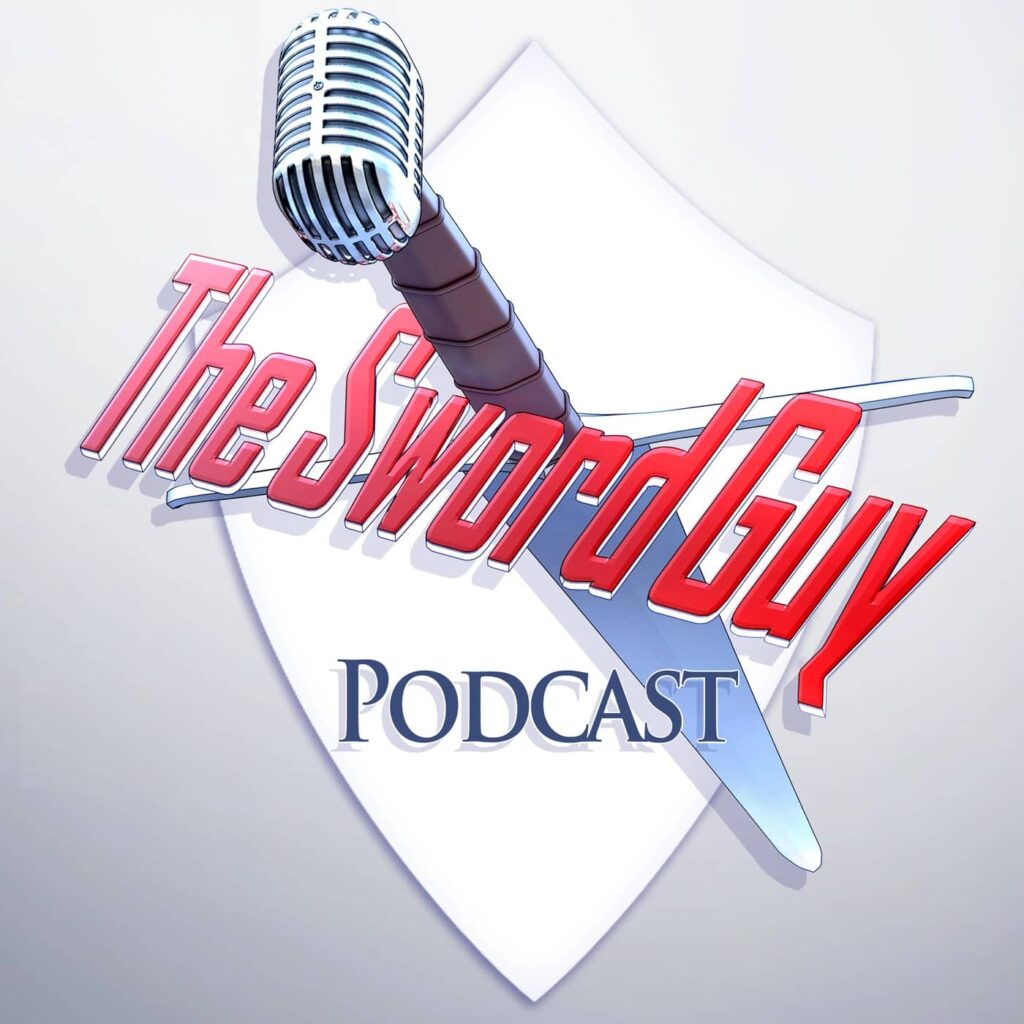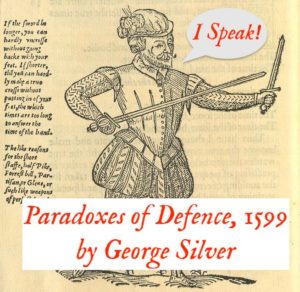GW: Hello, sword people, welcome to The Sword Guy podcast. This is your host, Dr Guy Windsor, Consultant Swordsman, teacher and writer. Join me for interviews with historical fencing instructors and experts from a wide range of related disciplines as we discus swords, history, training, and bringing the joy of historical martial arts into our modern lives. Today’s episode is a little different. I’m here to tell you about a fascinating new project, which is the audiobook version of George Silver’s Paradoxes of Defence.
George Silver’s Paradoxes of Defence was a book written in 1599 by a crusty old English gentleman who was horrified by what he saw as the ghastly innovations of Italian rapier and the danger that that put English fencers in, because instead of whacking each other over the head with big swords, as Englishmen will wont to do, they were now stabbing each other instead. He doesn’t object to the stabbing per se, he objects to what he sees as the unsafe nature of Italian fencing.
Now, leaving aside how accurate or not his interpretation of Italian fencing may have been, the book itself is a fascinating window into the martial arts of England in the 16th century and probably before. It seems to hark back to the medieval era and the weapons that Silver describes are what we would think of as largely medieval weapons, such as sword and buckler. He also emphasises the necessity of being able to handle yourself at close quarters, so wrestling, grappling, pommel striking, that sort of thing.
This is in contrast to, as he sees it, the complete lack of close quarter fighting with the Italian rapier. Even though Silver was a gentleman and not a fencing master, he clearly has a deep grasp of English martial arts at the time, to the point that he challenged the Italian rapier fencers or rapier teachers in London to fight with him and his brother upon a scaffold, basically like a grudge match or a challenge fight. So come along and prove the worthiness of your Italian fencing against us Englishmen. And according to Silver, at least, they built the scaffold and Toby and George waited there all day and none of the Italians showed up. Make of that what you will.
Silver also proposes a test for anyone proposing to teach the art of arms, which is to fight three Masters of Defence and three unskilful valiant men and three resolute men, half-drunk. And if you can defend yourself against the three masters, not one at a time obviously, we’re not talking about defence against multiple opponents, but one at a time. If you can defend against them and hurt, as he says, he means basically to strike them. And if you can get free of the rest, in other words, you can remain safe and there’s no obligation to actually hit the unskilful man or the half-drunk man, then you are indeed to be recognised as a good and true master of defence and qualified, as Silver sees it, to teach fencing.
The fencing theory that Silver espouses has gained quite a lot of traction in modern historical martial arts, particularly his grounds and governors and his true times versus his false times. So, for example, the true times are when you strike with the hand, the hand and body, the hand, body and foot, or the hand, body and feet, the false times are the time of the foot, the time of the foot and body, the time of the foot body and hand, the time of the feet, body and hand. And what this means is that when you are attacking somebody, you should lead with your hand, your body and your feet should follow and you shouldn’t step in to measure where they can hit you without first presenting a threat. And this is a fundamentally true statement, which is true for pretty much every martial art I’ve ever come across.
So, George Silver’s Paradoxes of Defence is a fundamentally important book for any student of historical martial arts. It is not a complete fencing method, but it is a very thorough description of the parlous state of fencing as he saw it in the late 16th century, as well as descriptions of certain Italian fencing masters who do not come across very well. But you must bear that in mind when you’re listening to this, that Silver, shall we say, has an axe to grind or a sword to sharpen.
The purpose of this audiobook edition is firstly so that you can simply listen to the book while you’re doing other things, driving a car or making dinner for your kids or whatever it is. Audio books are really useful for that. And because this book does not depend on images, there are a few, but they’re not critical to understanding what he’s talking about, it is a perfect choice of a fencing manual to put into audio book format.
And over the last 15 years or so, there has been a huge amount of work done to recover what is known as “original pronunciation”, which is figuring out how English was spoken on Shakespeare’s stage primarily, but from any textual source, you can you can see from the spellings and from the rhyme schemes and various other data points, you can come to at least an educated guess as to how that dialect would have been pronounced at the time. The linguist David Crystal has done a fantastic amount of work on this subject and has produced many books on this subject also, and his son, Ben Crystal, happens to be a Shakespearean actor who has specialised in Shakespearean pronunciation, or shall we say, original pronunciation over the last decade or so. Who better then to read George Silver for us in the original pronunciation, or at least as close as scholarship can determine?
It struck me as a golden opportunity for us to compare modern pronunciation to original pronunciation. So I have also hired Jonathan Hartman, a classically trained actor, to read George Silver’s Paradoxes of Defence in modern pronunciation. By listening to these back to back or next to each other, (I wouldn’t recommend listening to them at the same time,) you can get a really clear idea of how it has changed. The proof is in the listening. So without further ado, here is an extract of my favourite passage from the whole book, read by Jonathan Hartmann in modern pronunciation:
JH: And moreover, the exercising of weapons puts away aches, griefs and diseases. It increases strength and sharpens the wits. It gives a perfect judgement. It expels melancholy, choleric and evil conceits. It keeps a man in breath, perfect health and long life. It is unto him that has the perfection thereof a most friendly and comfortable companion when he is alone having but only his weapon about him. It puts him out of fear. And in the wars and places of most danger, it makes him bold, hardy and valiant.
GW: And now here is Ben Crystal reading the same extract in original pronunciation:
BC: And moreover, the exercising of weapons putteth away aches, griefs and diseases. It increases strength and sharpeneth the wits. It giveth a perfect judgement. It expelleth melancholy, choleric and evil conceits. It keepeth a man in breath, perfect health and long life. It is unto him that hath the perfection thereof a most friendly and comfortable companion when he is alone having but only his weapon about him. It putteth him out of fear. And in the wars and places of most danger, it maketh him bold, hardy and valiant.
GW: Aren’t they fabulous? I love them both. I think my heart lies more with the original pronunciation than the modern, because I am, after all, a historical martial artist, and I have spent much of my life trying to figure out how things used to be done. But it’s really clear to me that anyone who has an interest in historical martial arts, in historical performance, in 16th century literature, in 16th century drama, or in linguistics, will find this an absolutely indispensable part of their listening library. I’m currently crowdfunding this project and you can find out more at www.guywindsor.net/silver while the campaign is live. That will take you directly to the campaign and afterwards that will take you to a Web page full of Silver related resources such as the images from his books. That’s www.guywindsor.net/silver. Go and get you some audio magic. Thanks for listening.

